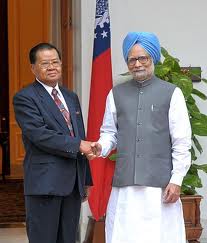Burmese Days
US Secretary of State Hillary Clinton’s recent visit to Myanmar (Burma), noted largely for a memorable photo opportunity with a wan but smiling Aung San Suu Kyi, signaled a significant change in the geopolitics surrounding a land that has faced decades of isolation, sanctions, and widespread condemnation for its human-rights violations.
Twenty-one years ago, after Suu Kyi’s National League for Democracy (NLD) swept a general election, the results were annulled, the party’s leaders and workers were incarcerated or exiled, and two decades of ruthless – and remarkably opaque – military rule followed. This year has witnessed political opening, the release of several prominent political prisoners, and evidence of self-assertion by the nominally civilian government (headed by a former general, Thien Sein). Suu Kyi’s announcement of her intention to contest a by-election to the new parliament offers a glimmer of hope that democrats could use the fledgling political process to create something resembling genuine representative government.
Burma’s military rulers are cynically hoping to use Suu Kyi’s participation in the parliamentary

When the generals in Rangoon (Yangon) suppressed a popular uprising in 1988, overturned the NLD’s overwhelming electoral victory, shot students, and arrested the new democratically elected leaders, India’s government initially reacted as most Indians would have wanted. For many years, India was unambiguously on the side of democracy, freedom, and human rights in Burma – not only rhetorically, like the regime’s Western critics, but also in more tangible ways. It offered asylum to fleeing students, allowed them to operate their resistance movement within India (with some financial help), and supported a pro-democratic newspaper and a radio station.
Then reality intruded. India’s strategic rivals, China and Pakistan, began to cultivate the Burmese generals. Major economic and geopolitical concessions were offered to both suitors. The Chinese even began developing a port on the Burmese coast, far closer to Calcutta than to Canton. And the junta’s generals began providing safe havens and arms to a motley assortment of anti-India rebels that would wreak havoc in the country’s Northeastern states and retreat to sanctuaries in newly renamed Myanmar.
Four of India’s politically sensitive Northeastern states have international borders with Myanmar. But the key development was the discovery of large natural-gas deposits in Burma, which would not be available to an India deemed hostile to the regime. India realized that its rivals were gaining ground in its backyard, while it was losing out on new economic opportunities. The price of pursuing a moral foreign policy became too high.
 So India turned 180 degrees. The increasingly forlorn resistance operations based on Indian territory were shut down. And India sweetened the generals’ tea by providing both military assistance and intelligence support in their never-ending battles against their own rebels.
So India turned 180 degrees. The increasingly forlorn resistance operations based on Indian territory were shut down. And India sweetened the generals’ tea by providing both military assistance and intelligence support in their never-ending battles against their own rebels. India had gone from standing up for democracy to aiding and enabling the military regime. As I wrote at the time, “India’s policy may be governed by the head rather than the heart, but in the process we are losing a little bit of our soul.”
Yet, paradoxically, Myanmar’s gradual opening following the 2011 elections and the installation of Thien Sein as president may offer India some measure of vindication. As the new regime released political prisoners, permitted freedom of movement to the detained Suu Kyi, and even questioned the environmental and economic impact of a big Chinese dam project in the country’s north, Western critics began to acknowledge that genuine change might be on the way.
Countries like India that had maintained links with the junta and gently prized open its clenched fist may well have achieved more than those whose threats, bluster, and sanctions had merely hardened the general’s stance.
In canceling a $3.6 billion Myitsone hydro-electric project (90% of whose electricity would have been exported to China), the Burmese government surprised most observers, even though Chinese analysts were quick to express understanding of the government’s desire not to be seen as wholly subservient to a much more powerful neighbor. But the signal is clear: Myanmar is not a Chinese vassal state, and is willing to diversify its foreign relations.
It is in Burma’s interests to have more than one suitor wooing it; offsetting one neighbor against another is a time-honored diplomatic practice. Though China’s engagement dwarfs India’s, Myanmar-India bilateral trade reached almost $1.1 billion in 2010-2011, and India is now Myanmar’s fourth-largest trading partner, after Thailand, Singapore, and China, accounting for 70% of the country’s agricultural exports.
Economics can always open political doors. “That Myanmar could defy the Chinese,” wrote Indian scholar Sreeram Chaulia, “is being seen as a sign that political space exists for the US to work as a facilitator of the democratization process in Myanmar.” Clinton’s visit brought confirmation that India has been playing a quiet but effective role in promoting greater engagement with the Burmese.
India cannot and should not seek to outdo China in appeasing the military junta. Its natural instincts lie with the Burmese democrats, Suu Kyi, and the former students for whom it has, over the years, shown its support. With the US signaling its willingness to take Thein Sein’s political openness at face value, the stage is set for the region’s democracies, especially India, to open Burma’s windows to the world. China will be watching closely.
Shashi Tharoor, a former Indian Minister of State for External Affairs and UN Under-Secretary General, is a member of India’s parliament and the author of a dozen books, including India from Midnight to the Millennium and Nehru: the Invention of India.





















































